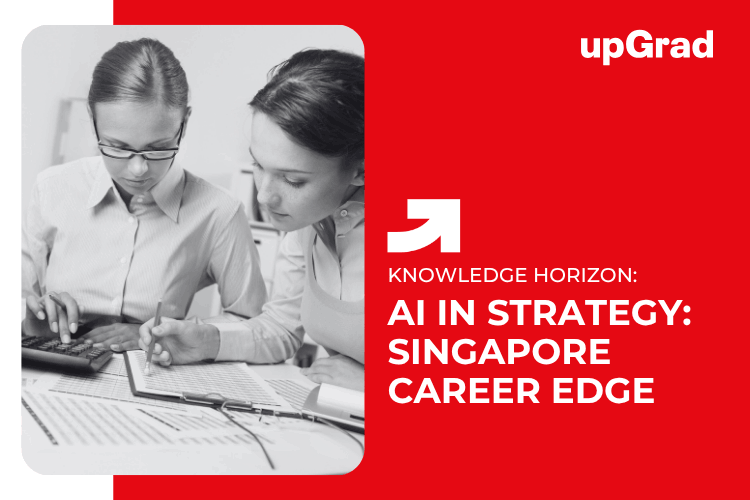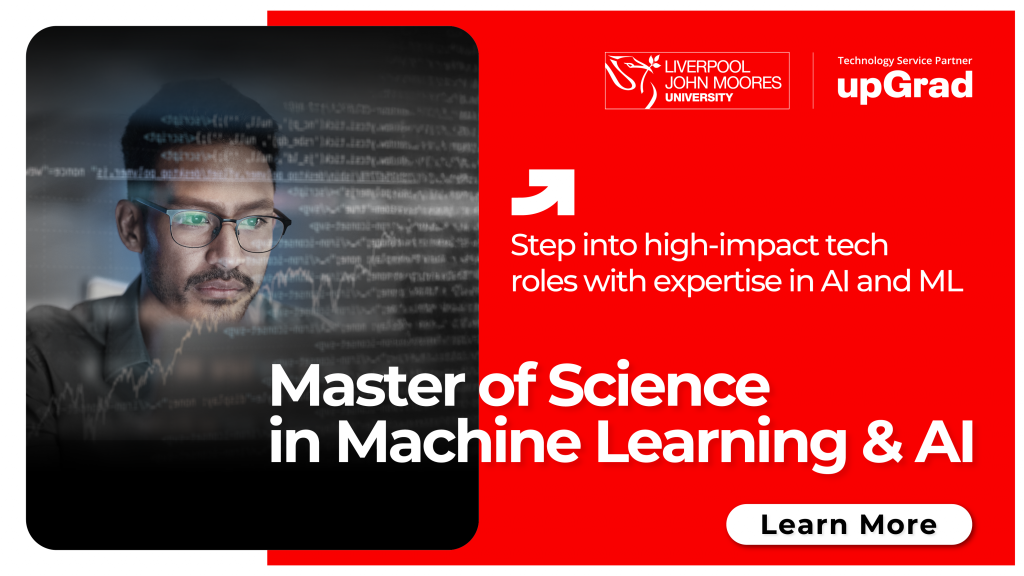In the fast-paced business environment of Singapore, AI has evolved from a niche tool to a strategic imperative. This necessity is also evident from the salaries that companies are paying to AI and Machine Learning (ML) professionals. For example, the base monthly pay of an AI engineer in Singapore is SGD 6,000, but it can increase to SGD 7,000 based on various factors. AI-enhanced strategies are driving measurable value in multiple areas, ranging from operations to customer engagement. In this context, professionals at different levels, such as managers and executives, need to learn how to utilise AI to make more informed business decisions, thereby enhancing their career trajectories.
This blog will discuss how professionals in Singapore can utilise AI in their business strategies to advance their careers and also highlight the qualities that organisations look for when hiring AI-driven professionals.
Take your skills to the next level — Explore Online MBA Courses
AI in Business Strategy: Career Advantages & Strategic Impact
Using AI in business can offer significant strategic benefits, as well as career advantages. It helps them make better business decisions, drives them to be more efficient, and provides a competitive advantage through the automation of tasks and analysis of vast amounts of data.
Opening High-Demand Career Paths
In Singapore, companies across various industries are utilising AI in business operations to make informed decisions, and as a result, professionals proficient in AI are in high demand. When professionals understand how to utilise AI for business strategies, such as predictive analytics, customer insights, and automation, it can lead them to landing roles like AI strategy consultant, product manager, and business analyst.
Professionals who have a firm grasp of both business and AI basics can bridge both leadership and technical gaps.
Enabling Data-Driven and Smarter Decision-Making
AI can transform business strategy by changing raw data into actionable insights. There are numerous ways in which AI-driven business models can help businesses make more accurate and faster decisions, such as supply chain optimisation and customer behaviour predictions.
When professionals understand the ways to use AI for strategic business planning, they can help organisations remain competitive even in volatile markets.
Also Read: AI Career Opportunities in Singapore : A Guide to Thriving in Tech
Boosting Productivity
With the help of AI for business leaders, companies can automate repetitive and routine tasks, such as generating reports, updating customer relationship management (CRM) systems, and tracking inventories. These benefits allow professionals to focus more on creative and strategic thinking.
Businesses can boost productivity and reduce expenses by incorporating AI into their operations. This capacity to innovate can open doors for them to entrepreneurship, strategic advisory, and intrapreneurship roles.
Also Read: How Long Does It Take to Learn New AI Skills?
Creating New Business Models
AI is more than just a tool; it is the basis for entirely new ways to do business nowadays. Businesses can utilise AI in various ways to create scalable and personalised solutions, such as AI-generated content, dynamic pricing, and intelligent product recommendations.
Professionals who accept and utilise AI can help design progressive strategies that enable brands to create a unique identity, allowing them to stand out in crowded markets.
Lifelong Adaptability and Learning
If companies want to stay ahead in using AI in business strategy, they have no option but to embrace continuous learning. Professionals must upskill in areas such as AI, data analytics, and machine learning (ML), as this makes them more adaptable — a crucial trait in today’s rapidly changing industries.
Also Read: 10 Advanced Generative AI Techniques to Boost Workflow in Today’s In-Demand Careers
What Organisations Look for in AI-Driven Professionals
When companies in Singapore hire for AI and leadership positions within their organisation, they look for candidates who possess the ideal combination of technical expertise, the ability to adapt quickly to evolving technologies, and commendable problem-solving skills.
| Technical Skills | Soft Skills | Additional Skills |
| Programming Languages Machine Learning Frameworks Data Evaluation and Modelling Cloud Computing Platforms Understanding Algorithms |
|
|
Also Read: Getting Started with Generative AI: Best Practices for Working Professionals in Singapore
How upGrad Helps You Build AI Strategy Expertise
The AI and ML courses available through upGrad can help students learn how to use AI strategy in their work. These certification programs are designed exclusively for professionals, assisting students to achieve a high level of excellence in AI. They also provide them with dynamic online training to master the art of generative AI. These programs are from the top 1% of universities in the world, which also helps.
- Master of Science in Machine Learning & AI, Liverpool John Moores University
- Executive Diploma in Machine Learning and AI, IIIT Bangalore
🎓 Explore Our Top-Rated Courses in Singapore
Take the next step in your career with industry-relevant online courses designed for working professionals in Singapore.
FAQs on Role of AI in Business Strategy
Q: What roles in business strategy require AI skills?
Ans: Various business strategy roles, such as the following, need AI skills more than others nowadays:
- AI Strategists.
- Heads of AI/ML.
- Customer Insights.
- Product Managers.
Q: How much does AI adoption elevate salary in Singapore?
Ans: In Singapore, AI adoption can significantly increase salaries – some reports suggest that professionals who acquire AI skills can experience a nearly 25% wage increase.
Q: Do I need to code to apply AI in strategy roles?
Ans: No, candidates do not necessarily have to know coding to apply AI in strategy roles. Technical skills are indeed valuable, but many strategic positions associated with AI emphasise understanding AI applications, market dynamics, and ethics instead of hands-on development.
Q: How does AI-driven decision-making affect departmental KPIs?
Ans: AI-powered decision-making can substantially improve key performance indicators (KPIs) of various departments by enhancing accuracy, strategic alignment, and efficiency.
Q: How does upGrad support AI strategy career growth?
Ans: upGrad offers AI and ML students expert-led programs, one-on-one mentorship, and hands-on projects, which help them gain the skills necessary to succeed as business consultants.









